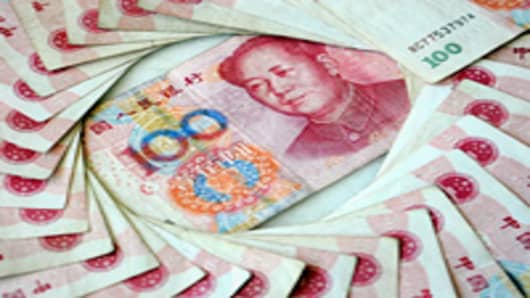Harsh words from Republican candidate Mitt Romney about branding China a currency manipulator if he's elected president next month is politics, but the rhetoric may well encourage Beijing to keep nudging its currency higher in the weeks ahead to avoid being at the center of the U.S. election debate, analysts say.
The pace of appreciation in the yuan has picked up in recent weeks, helped by the latest round of monetary easing by global central banks in recent weeks. The currency hit a record high at about 6.2520 per U.S. dollar on Wednesday, taking its gains since late July to around 2 percent.
"There's no doubt that the more aggressive stance taken by Romney will raise eyebrows in Beijing, " said Mitul Kotecha, head of global currency research at Credit Agricole in Hong Kong. "The strengthening in the yuan is not all related to the election but it is not a coincidence that the U.S. election is looming and the yuan's fixing is higher."
China's central bank sets a midpoint for yuan trade each day from which the currency can rise or fall by 1 percent and its value has often risen in the run up to events where global currencies are in focus.
U.S. lawmakers have long held a view that China has kept its currency artificially cheap, giving Chinese exports an unfair advantage and making currencies a contentious issue between Washington and Beijing.
Romney, during a debate with President Barack Obama on Tuesday, said he would label China a currency manipulator on his first day in office — a promise he often works into his campaign speeches. (Read More: Debate II: Obama Goes on Offensive Against Romney. )
"They (China's policy makers) certainly don't want the currency to be a big theme in the election, probably because they don't want Romney to say something like he did in the debate, " Robin Bew, chief economist at the Economist Intelligence Unit, told CNBC Asia's "Squawk Box" on Thursday. "So from their perspective, they are guiding the yuan higher."
Confidence on Economy
Analysts said the rise in the yuan also reflected increased confidence by Beijing about the outlook for the Chinese economy.
China's Premier Wen Jiabao said on Wednesday the country's economic situation in the third quarter of the year was "relatively good."
The Chinese economy grew 7.4 percent in the third quarter from a year ago, the slowest pace since the first quarter of 2009, data on Thursday showed. (Read More: China Economy Hits Bottom, Is It Time to Buy Stocks? )
Still, the data were in line with expectations and analysts said other data showing a 9.2 percent annual rise in industrial output and a 14.2 percent gain in retail sales in September from a year earlier were broadly positive for the yuan, which up until July had fallen against the dollar — partly reflecting weakness in the economy.
"We are looking at better data from China and that is positive for the yuan so there's a combination of this and the U.S. election backdrop to explain the yuan's gains, " said Nizam Idris, head of strategy for fixed income and currencies and Macquarie Bank.
Will Romney Walk the Walk?
Romney's warning about labeling China a currency manipulator, a move that could lead to economic sanctions against Beijing, is unlikely to become a reality if the Republican is elected president, said Bew.
"Well he's not (going to call China a currency manipulator). It would be an absolute disaster for the U.S. economy. I can't begin to imagine the damage it would do to bilateral relations, " Bew said. "When you're not in office and you're hoping to get elected you can say all kinds of stuff, when you're running the country, it becomes a whole lot more difficult."
The yuan's rise may take some heat out of the debate. The currency has appreciated 24 percent since 2005 when China abandoned the yuan's peg to the greenback.
The International Monetary Fund said in July the yuan was only "moderately undervalued" against a basket of currencies, suggesting less international pressure on Beijing over its currency policy.
Still, having targeted China's currency policy, Romney may find it hard to back down.
"It would be difficult for Romney to backtrack from his comments, so it is difficult to tell what would happen if Romney is elected, " said Kotecha at Credit Agricole.
—By CNBC's Dhara Ranasinghe



